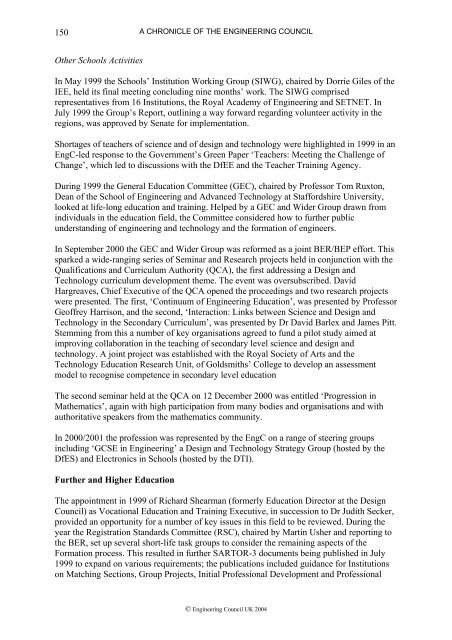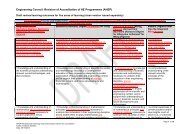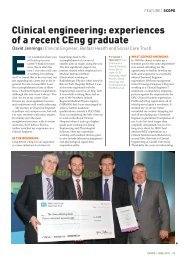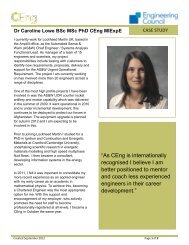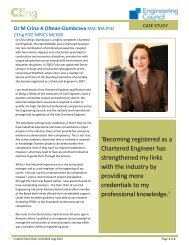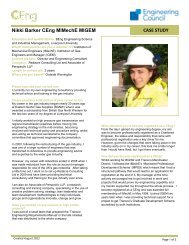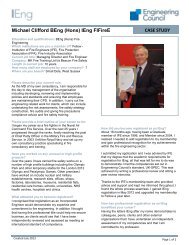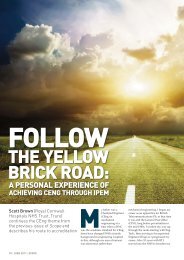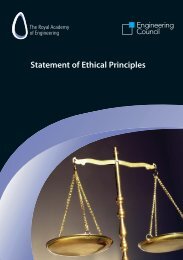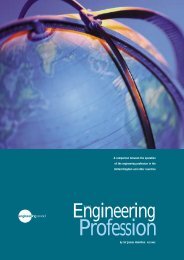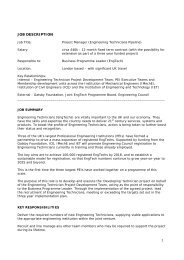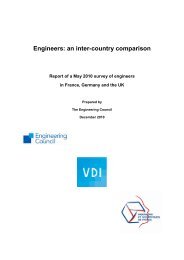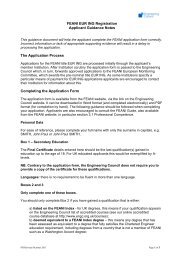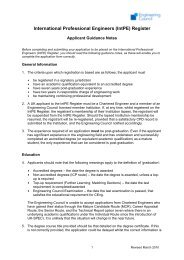An Engine for Change - A Chronicle of the Engineering Council
An Engine for Change - A Chronicle of the Engineering Council
An Engine for Change - A Chronicle of the Engineering Council
You also want an ePaper? Increase the reach of your titles
YUMPU automatically turns print PDFs into web optimized ePapers that Google loves.
150A CHRONICLE OF THE ENGINEERING COUNCILO<strong>the</strong>r Schools ActivitiesIn May 1999 <strong>the</strong> Schools’ Institution Working Group (SIWG), chaired by Dorrie Giles <strong>of</strong> <strong>the</strong>IEE, held its final meeting concluding nine months’ work. The SIWG comprisedrepresentatives from 16 Institutions, <strong>the</strong> Royal Academy <strong>of</strong> <strong>Engine</strong>ering and SETNET. InJuly 1999 <strong>the</strong> Group’s Report, outlining a way <strong>for</strong>ward regarding volunteer activity in <strong>the</strong>regions, was approved by Senate <strong>for</strong> implementation.Shortages <strong>of</strong> teachers <strong>of</strong> science and <strong>of</strong> design and technology were highlighted in 1999 in anEngC-led response to <strong>the</strong> Government’s Green Paper ‘Teachers: Meeting <strong>the</strong> Challenge <strong>of</strong><strong>Change</strong>’, which led to discussions with <strong>the</strong> DfEE and <strong>the</strong> Teacher Training Agency.During 1999 <strong>the</strong> General Education Committee (GEC), chaired by Pr<strong>of</strong>essor Tom Ruxton,Dean <strong>of</strong> <strong>the</strong> School <strong>of</strong> <strong>Engine</strong>ering and Advanced Technology at Staf<strong>for</strong>dshire University,looked at life-long education and training. Helped by a GEC and Wider Group drawn fromindividuals in <strong>the</strong> education field, <strong>the</strong> Committee considered how to fur<strong>the</strong>r publicunderstanding <strong>of</strong> engineering and technology and <strong>the</strong> <strong>for</strong>mation <strong>of</strong> engineers.In September 2000 <strong>the</strong> GEC and Wider Group was re<strong>for</strong>med as a joint BER/BEP ef<strong>for</strong>t. Thissparked a wide-ranging series <strong>of</strong> Seminar and Research projects held in conjunction with <strong>the</strong>Qualifications and Curriculum Authority (QCA), <strong>the</strong> first addressing a Design andTechnology curriculum development <strong>the</strong>me. The event was oversubscribed. DavidHargreaves, Chief Executive <strong>of</strong> <strong>the</strong> QCA opened <strong>the</strong> proceedings and two research projectswere presented. The first, ‘Continuum <strong>of</strong> <strong>Engine</strong>ering Education’, was presented by Pr<strong>of</strong>essorGe<strong>of</strong>frey Harrison, and <strong>the</strong> second, ‘Interaction: Links between Science and Design andTechnology in <strong>the</strong> Secondary Curriculum’, was presented by Dr David Barlex and James Pitt.Stemming from this a number <strong>of</strong> key organisations agreed to fund a pilot study aimed atimproving collaboration in <strong>the</strong> teaching <strong>of</strong> secondary level science and design andtechnology. A joint project was established with <strong>the</strong> Royal Society <strong>of</strong> Arts and <strong>the</strong>Technology Education Research Unit, <strong>of</strong> Goldsmiths’ College to develop an assessmentmodel to recognise competence in secondary level educationThe second seminar held at <strong>the</strong> QCA on 12 December 2000 was entitled ‘Progression inMa<strong>the</strong>matics’, again with high participation from many bodies and organisations and withauthoritative speakers from <strong>the</strong> ma<strong>the</strong>matics community.In 2000/2001 <strong>the</strong> pr<strong>of</strong>ession was represented by <strong>the</strong> EngC on a range <strong>of</strong> steering groupsincluding ‘GCSE in <strong>Engine</strong>ering’ a Design and Technology Strategy Group (hosted by <strong>the</strong>DfES) and Electronics in Schools (hosted by <strong>the</strong> DTI).Fur<strong>the</strong>r and Higher EducationThe appointment in 1999 <strong>of</strong> Richard Shearman (<strong>for</strong>merly Education Director at <strong>the</strong> Design<strong>Council</strong>) as Vocational Education and Training Executive, in succession to Dr Judith Secker,provided an opportunity <strong>for</strong> a number <strong>of</strong> key issues in this field to be reviewed. During <strong>the</strong>year <strong>the</strong> Registration Standards Committee (RSC), chaired by Martin Usher and reporting to<strong>the</strong> BER, set up several short-life task groups to consider <strong>the</strong> remaining aspects <strong>of</strong> <strong>the</strong>Formation process. This resulted in fur<strong>the</strong>r SARTOR-3 documents being published in July1999 to expand on various requirements; <strong>the</strong> publications included guidance <strong>for</strong> Institutionson Matching Sections, Group Projects, Initial Pr<strong>of</strong>essional Development and Pr<strong>of</strong>essional© <strong>Engine</strong>ering <strong>Council</strong> UK 2004


